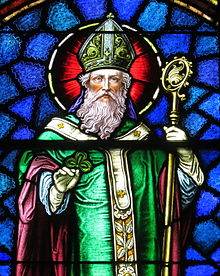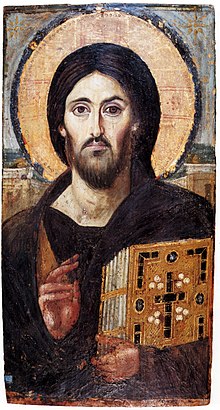Portal:Religion
The Religion Portal
Religion is a range of social-cultural systems, including designated behaviors and practices, morals, beliefs, worldviews, texts, sanctified places, prophecies, ethics, or organizations, that generally relate humanity to supernatural, transcendental, and spiritual elements—although there is no scholarly consensus over what precisely constitutes a religion. Different religions may or may not contain various elements ranging from the divine, sacredness, faith, and a supernatural being or beings. (Full article...)
 Vital article
Vital article
Vital articles to understand Religion.
Prayer is an invocation or act that seeks to activate a rapport with an object of worship through deliberate communication. In the narrow sense, the term refers to an act of supplication or intercession directed towards a deity or a deified ancestor. More generally, prayer can also have the purpose of thanksgiving or praise, and in comparative religion is closely associated with more abstract forms of meditation and with charms or spells. (Full article...)
 Did you know (auto-generated)
Did you know (auto-generated)
Did you know it about Religion?
- ... that the Grave with the Hands commemorates a married couple, divided by society and religion, with hands clasped over a cemetery wall after death?
- ... that fictional religions, often described in speculative fiction, have in some cases inspired real religious movements?
- ... that Catherine de Parthenay, a 16th-century Huguenot leader, was a member of "a highly successful network of information" during the French Wars of Religion?
- ... that Freedom of Religion South Africa filed an unsuccessful lawsuit to keep child spanking legal?
- ... that the nonconformist minister Ichabod Chauncey was banished from England under the Religion Act 1592 and spent two years in exile in Holland where he published a defence of his actions?
- ... that religious studies scholar C. Jouco Bleeker believed that religions are like acorns?
Featured articles in Religion.

Top 10 WikiProject Religion Popular articles of the month
This following Religion-related articles is a most visited articles of WikiProject Religion, See complete list at Wikipedia:WikiProject Religion/Popular pages.
 Subcategories
Subcategories
Select [►] to view subcategories
Topics
Select [show] to view subtopics
 Get involved
Get involved
For editor resources and to collaborate with other editors on improving Wikipedia's Religion-related articles, visit WikiProject Religion.
Discover Wikipedia using portals









































![Image 1 A map of countries where Nowruz is celebrated or are public holidays Nowruz (Persian: نوروز [noːˈɾuːz]) is the Iranian or Persian New Year celebrated by various ethnic groups worldwide. It is a festival based on the spring equinox—which marks the first day of the new year in the Iranian Solar Hijri calendar, on or around 21 March on the Gregorian calendar. (Full article...)](http://upload.wikimedia.org/wikipedia/en/d/d2/Blank.png)



















